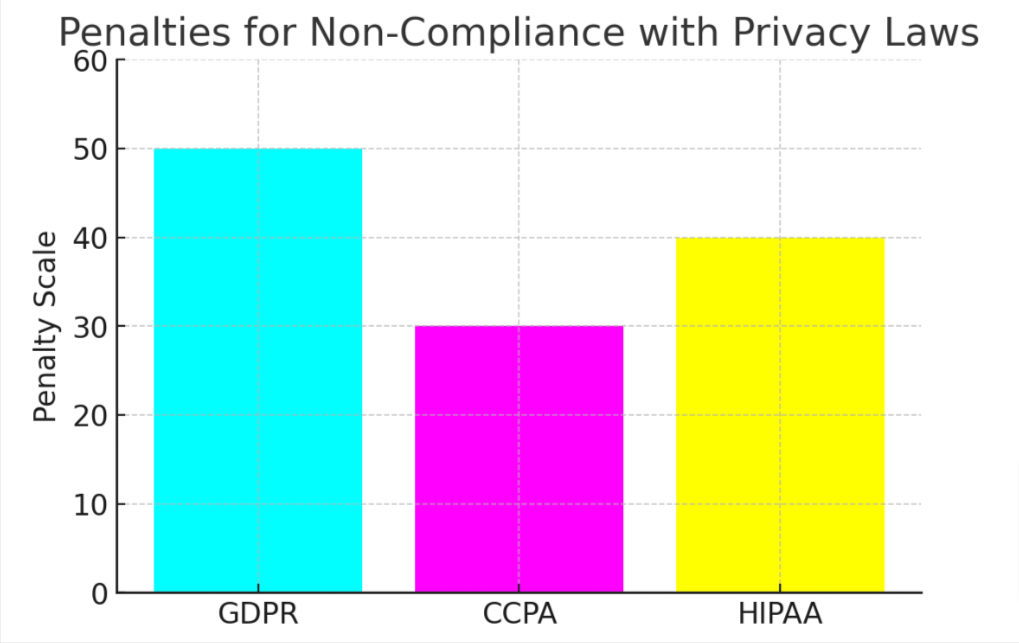Navigating Legalities: A Guide to Privacy Laws in Live Chat Operations
Are you worried about who might be peeking into your live chat conversations? In today’s digital world, a startling number of laws exist to protect your words and data online. This article shines a light on how privacy legislation keeps your chats safe from prying eyes and what you need to keep in mind to stay compliant.
Dive in for peace of mind!
Key Takeaways
- Privacy laws like GDPR, CCPA, and HIPAA have been established to protect personal information during live chat conversations.
- Businesses must stay informed about these privacy regulations to prevent unauthorized access to customer data and avoid legal penalties.
- Compliance with these privacy laws not only secures sensitive data but also builds trust between companies and their customers.
- Regular updates and education on the latest privacy law developments are necessary for companies to maintain compliance.
- Controlling data sharing settings in live chat platforms is essential for protecting personal information according to privacy legislation.
Overview of Privacy Laws Affecting Live Chat Conversations
Understanding the various privacy laws affecting live chat conversations is crucial for businesses and individuals alike. From territory-specific laws like GDPR and CCPA to industry-specific laws such as HIPAA and GLBA, staying informed on these regulations is essential in protecting personal data and ensuring compliance.
Territory-specific laws (GDPR, CCPA, CPRA, Brazil)
Territory-specific laws play a crucial role in shaping how live chat conversations are handled. These regulations ensure that personal information security stays at the forefront of online interactions.
- The General Data Protection Regulation (GDPR) is Europe’s golden standard for data privacy regulations. It gives individuals control over their personal data and applies to all companies operating within the EU, regardless of where they are based.
- California residents benefit from the California Consumer Privacy Act (CCPA), which boosts individual data rights and protections. Businesses must disclose what data they collect and grant consumers the right to access and request the deletion of their information.
- Enhancing CCPA, the California Privacy Rights Act (CPRA) adds more layers to consumer privacy regulations. It allows Californians to correct inaccurate personal information and limits businesses from using sensitive personal data.
- Brazil’s approach to privacy legislation mirrors GDPR with its Lei Geral de Proteção de Dados (LGPD). This law grants Brazilian citizens significant insight and control over how their personal information is collected, used, and shared.
Industry-specific laws (HIPAA, GLBA, FERPA)
Industry-specific laws play a crucial role in safeguarding personal information during live chat interactions. Each set of rules targets different sectors, ensuring data privacy concerns are handled effectively.
- The Health Insurance Portability and Accountability Act (HIPAA) sets the standard for protecting sensitive patient health information. Healthcare providers using live chat must ensure conversations are encrypted and access is tightly controlled to comply with HIPAA.
- The Gramm-Leach-Bliley Act (GLBA) applies to financial institutions. It mandates that companies explain their information-sharing practices to their customers and protect sensitive data. Live chat services in the finance sector must therefore have robust security measures to prevent unauthorized access to customer data.
- The Family Educational Rights and Privacy Act (FERPA) protects the privacy of student education records. Schools using live chat platforms need consent from parents or eligible students before sharing educational records, making sure these conversations remain private.
Importance of Complying with Privacy Laws
Complying with privacy laws is crucial to protecting vulnerable individuals and preventing theft, as well as holding companies accountable for their handling of customer data. It’s important to understand the impact and implications of these laws on live chat conversations.
Protecting vulnerable individuals
Protecting vulnerable individuals is a crucial aspect of privacy law compliance. Personal information security takes center stage in online interactions, particularly through live chat.
Laws like the Children’s Online Privacy Protection Act (COPPA) specifically address the privacy rights of minors, creating safeguards against unauthorized data collection and misuse.
Similarly, health-related chats may fall under regulations such as HIPAA, ensuring patients’ sensitive details remain confidential.
Companies must prioritize customer data protection to shield both themselves and their users from harm. This means implementing robust privacy policies that respect individual data rights and protections.
It involves training staff in recognizing potential threats to personal data security and establishing clear protocols for electronic communication privacy. Such steps ensure not only legal adherence but also trust-building with consumers who rely on businesses to keep their private conversations safe from prying eyes or malicious intent.
Preventing theft and holding companies accountable
By safeguarding customer data and privacy, companies actively work to prevent theft and hold themselves accountable. When organizations prioritize robust security measures and compliance with privacy laws, they create a shield against potential breaches and unauthorized access to sensitive information.
By implementing strong encryption protocols and setting strict user access controls, companies can deter cybercriminals from gaining unlawful access to personal information or engaging in fraudulent activities.
Maintaining transparency about data collection practices along with providing clear guidelines on how customer information is handled assures accountability. Businesses who are transparent about their data handling processes demonstrate their commitment to protecting consumer rights and fostering trust among their clientele.
Current U. S. Privacy Laws
HIPAA protects the privacy of medical records and personal health information, while GLBA safeguards consumers’ financial information held by financial institutions. COPPA also regulates the collection and use of personal information from children under 13 years old.
HIPAA
HIPAA safeguards individuals’ private health information by imposing strict guidelines on its use and disclosure. Covered entities, such as healthcare providers and insurers, must ensure the confidentiality of patient data, restricting access to authorized personnel only.
Compliance with HIPAA involves implementing appropriate security measures and obtaining patients’ consent before sharing their personal health information.
Understanding how HIPAA affects live chat conversations is crucial for businesses in the healthcare industry. They must guarantee that confidential patient details shared via live chat are appropriately protected to comply with HIPAA regulations while providing efficient customer service.
GLBA
The Gramm-Leach-Bliley Act (GLBA) requires financial institutions to safeguard customers’ sensitive personal and financial information. This includes ensuring the security of customer data stored online or transmitted through electronic means.
Financial institutions covered by GLBA are required to inform customers about their privacy policies and practices regarding the collection, use, and disclosure of personal information.
They must also provide customers with the opportunity to opt-out of having their information shared with non-affiliated third parties.
COPPA
Moving on to the next privacy law affecting live chat conversations, we have COPPA. The Children’s Online Privacy Protection Act (COPPA) is a U.S. federal law designed to protect the privacy of children under 13 by requiring parental consent for the collection and use of their personal information online.
Under COPPA, websites and online services must obtain verifiable parental consent before collecting personal information from children. This includes data such as names, addresses, phone numbers, or any other identifiable information.
Websites must also clearly outline their privacy policies and practices regarding children’s information in a manner easily accessible to parents.

Complying with Data Privacy Laws
Understanding the basics of privacy in live chat and staying informed on the latest regulations are essential for companies to comply with data privacy laws. Controlling data and sharing settings is also crucial to ensure customer data protection.
Understanding the basics of privacy in chat
To ensure privacy in chat, it’s crucial to understand the basics of data protection. Start by familiarizing yourself with the relevant privacy laws and regulations, such as GDPR, CCPA, Brazil’s LGPD, or industry-specific laws like HIPAA for healthcare or FERPA for education.
It’s also essential to stay informed about the latest updates in privacy regulations and to control your data sharing settings vigilantly.
When using live chat for customer interactions, prioritize secure platforms that comply with these regulations. Additionally, be mindful of what information is being shared and collected during chats to uphold customer data protection rights while fostering trust and compliance within your organization.
Staying informed on latest regulations
Stay informed on the latest regulations by regularly reviewing official government websites and reputable industry newsletters. Utilize resources such as webinars, workshops, and online courses to stay up-to-date with the ever-changing landscape of privacy laws affecting live chat conversations.
Take advantage of professional memberships and networking opportunities to gain insights into how other companies are adapting to new regulations.
Keep an eye on updates from data protection authorities regarding any changes or clarifications in privacy laws. Engage with legal counsel or compliance professionals to ensure ongoing compliance with the most current regulations.
Controlling your data and sharing settings
To control your data and sharing settings, you must understand the basics of privacy in chat. Stay informed on the latest regulations to ensure compliance with data privacy laws. Adjust your privacy settings to determine who can access your personal information.
Understand the implications of sharing personal data in live chat conversations and the potential risks associated with it. Regularly review and update your privacy preferences based on changes in legislation and security measures. Be mindful of the information you share in live chat conversations, as some details may be considered sensitive or private under various privacy regulations. Take proactive measures to protect your personal data by utilizing secure platforms and encryption tools for chat communication.
Ensure that you are familiar with the terms of service and privacy policies of the chat platform you use to stay informed about how your data is handled and secured. Regularly monitor your data sharing permissions to align with current regulations and maintain optimal protection for your personal information.
Conclusion
Understanding privacy laws affecting live chat conversations is crucial for companies to protect customer data. Complying with data privacy regulations ensures the security of personal information and upholds individual data rights.
Staying informed on latest regulations and controlling data sharing settings are essential steps in maintaining online privacy. Maintaining compliance with privacy legislation not only safeguards sensitive information but also builds trust with customers.

